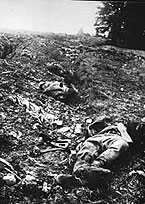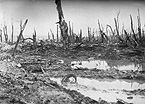Schrift: größer/kleiner
Inhaltsverzeichnis
Sie sind hier: WirRheinländer > english version > First World War (1914 - 1918) > Verdun
First World War (1914 - 1918)
Verdun
A Battle as a Symbol of Futility
Although there were battles during the First World War in which greater troop concentrations were involved, more material used and higher losses sustained, the battle of Verdun (21st Feb. – 15th Dec. 1916) still stands as the symbol of the senseless contempt for humanity and utter destruction of a materiel battle.
After October 1914, when mobile warfare had frozen into positional warfare, in 1915 the French side initially tried to bring movement back into the bogged-down front with several offensives, during which they sustained heavy losses.
In 1916 the Chief of the German General Staff at the time, General Erich von Falkenhayn, wanted to take the offensive, in order to forestall a Franco-British attack.

The aim of his attack was based on the war of 1870/71, with the town of Verdun surrounded by a strong fortified belt (code-name "Operation Judgement"). Here he intended to force the French Army into a so-called "battle to bleed them white". In his plans he calculated that for every two dead or seriously wounded Germans, there should be five dead Frenchmen. The first step towards his goal was a massed artillery bombardment aimed at a concentrated space. The effect of the heaviest guns, of exploding shells, shrapnel, gas grenades, together with mortars and flamethrowers, was supposed to avoid having to suffer the heavy losses of an infantry attack. All the infantry had to do would be to merely occupy the section of the opponent's territory, which had been completely destroyed by those weapons.
However, the cynical calculations of Falkenhayn did not work out, because he overestimated the destructive power of his artillery. Then, when the French side, under its new commander-in-chief, General Pétain, also deployed massed artillery from the other direction, the "blood-mill" of Verdun worked for both nations with the same cruelty.
 Soldiers were fighting on land which increasingly resembled a moonscape, enduring huge losses, often to capture a few metres' territory.
Soldiers were fighting on land which increasingly resembled a moonscape, enduring huge losses, often to capture a few metres' territory.
It would have meant a loss of prestige for the commanders of both nations to break off the battle. Without being able to bring about a conclusion, they simply fought on, although in order to make up for the appalling losses, fresh troops were needed, who had already been deployed to other sections of the front. Meanwhile at the Somme, the Franco-British offensive had begun, which meant an equally high number of troops was required on both sides.
At the end of the battle of Verdun, after a French counter-offensive, the German troops found themselves roughly in the same place they had been when they had started their offensive on 21st Feb. 1916. What remained were countless dead, maimed, wounded people, traumatized for life. Because many bodies were unrecognizable, mutilated, torn apart, buried and then hurled upwards again by artillery bombardments, it will never be possible to establish the exact numbers. Estimates assume that there must have been around 200,000 dead soldiers.
The generals responsible on both sides, in whose minds human lives only functioned as statistics, were never called to account: „The questionable method of mass breakthrough, which may be beyond our powers, is not necessary in this case. ...behind the French section of the western front there are targets within our reach, in the defence of which the French leadership is obliged to deploy their every last man. If they do so, they will see France's strength bled white, as no evasive action can be taken, irrespective of whether or not we achieve our goal. If they do not do so, and their target falls into our hands, that would have an appalling effect on morale in France. ..."
(From the memoirs of General Erich von Falkenhayn, which he wrote in 1919 as a kind of justification. The original of the memorandum, allegedly written in 1915 about the offensive on Verdun and sent to the Kaiser, has never been found until today.)


